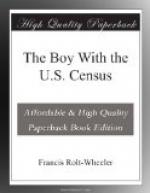[Illustration: “A BULL’S-EYE EVERY TIME!” The expert looking through telescope at target which he has fired at with new guns to test their accuracy. (Courtesy of Winchester Repeating Arms Co.)]
“I must thank you ever so much,” said the boy, turning to the director of the company who had taken so much trouble in showing him around, “it has been one of the most interesting afternoons I have had in all my life. I feel quite as though I had been witnessing the equipping of the world’s armies on the eve of a great war.”
“That would be all right,” said the business manager, “if we were making military rifles, but ninety-five per cent of our work is for sporting purposes.”
“But how about your cartridges?”
“There, perhaps,” Mr. Nebett said, “The Hague tribunal would look askance at us.”
Hamilton had his portfolio under his arm, but at the door he turned.
“How many cartridges do you put out?” he asked.
“Six million a day,” was the reply.
CHAPTER IV
THE BOY LEADER OF A CRUSADE
So long as Hamilton’s work dealt with the larger manufactories of the district he encountered comparatively little trouble, as he knew enough of the desires of the Census Bureau to be able to help those business men whose books did not specifically divide receipts, expenses, and so forth in the same order as the government required. Indeed, he made several very pleasant acquaintanceships during the weeks in New Haven, and it was not until he was “checking up,” going to all the small places that had not been listed, that he really found himself in difficulties. He anticipated trouble with the dressmakers, and consequently his delight was great when he learned that this had been omitted from the census since 1904 because it is a “neighborhood industry.” But the milliners proved just as bad.
In the first place, Hamilton could not work up any enthusiasm over a millinery establishment, and although he had definite instructions that each one was to be considered as a factory and entered upon the schedules as one, he thought such an idea was stretching the point a little far. Fortunately he had covered a large number of them during the first weeks of the work, visiting the places in the early morning and in the evening when the offices of the larger factories were closed. His worst clash occurred at almost the very last one to which he went.
It was a little after five o’clock, just as it was beginning to get dark, that Hamilton, having ascertained from the Business Telephone Directory the address of a milliner not down on his lists, who did work for wholesale as well as retail trade, went up the steps of a really handsome house, and rang the bell. He did so reluctantly, for there was no plate on the door, and he did not wish to annoy strangers. But the address seemed straight enough.




